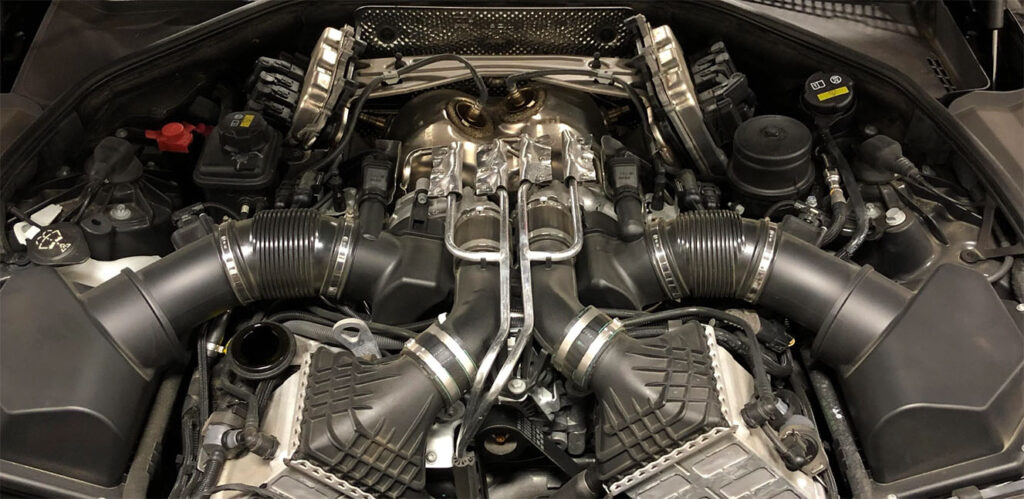The BMW S63 engine has powered some of the most powerful modern M cars, such as the M5, the X5M, and the new M8. While its immense power and torque output cannot be denied, its reliability has always been dubious.
Over the years, BMW has made significant improvements to this engine which has made it more reliable, going through various iterations culminating in the current S63 version, the S63B44T4 or also called S63TU4.
In this article, we’ll look at the S63’s reliability, and common engine issues, and discuss whether the S63 can be considered a reliable powerplant for potential buyers or current owners.
BMW S63 engine variations
| Version | Years produced | Models | Reliability |
|---|---|---|---|
| S63B44O0 | 2010-2013 | E70 X5M, E71 X6M | Suffered from many issues. We recommend you stay away from early S63’s. |
| S63B44T1 | 2011-2018 | F10 M5, F12 M6 | Massive improvement from the original S63. Complete rework in many aspects. |
| S63B44T2 | 2015-2018 | F85 X5 M, F86 X6 M | Further reliability and power improvements. |
| S63B44T4 | 2018 – present | F90 M5, F92 M8, F95 X5M, F96 X6M | Most reliable S63 variation to date. It is still a very high-maintenance engine. |
S63 reliability and common issues:
While the latest iteration of the S63 engine (S63B44T4) has seen vast improvements and doesn’t tend to suffer major catastrophic failures, it’s essential to be aware of some common issues that have plagued earlier versions and the current iteration to a minor degree:
1. Excessive oil consumption and insufficient oiling:
Earlier S63 engines faced problems with insufficient oiling due to a weak oiling system and excessive oil consumption.
The original S63 burned so much oil that it could run quite low on oil if you weren’t monitoring the oil level consistently or if the electronic oil level monitoring system failed to warn you on time.
BMW improved the oiling system as well as reduced the amount of oil consumption for the S63TU iterations, but it is still an oil-hungry engine.
2. Turbo oil return lines leak:
The hot-V of the S63 not only contains both turbochargers but also the other parts that support the turbocharger, such as oil return lines and coolant lines. O-rings and other rubber pieces can start leaking around 60K miles due to all the heat they’re exposed to.
3. Ignition coil failure:
Ignition coils on the S63 engine fail quite often, more prematurely than on any other BMW engine. Having an ignition coil fail on less than 30k miles is common, and this may be due to the high temperatures of the engine bay. We recommend replacing all ignition coils as well as the spark plugs every 30k to 50k miles.
4. High rod bearing wear:
Another common issue with the S63 engine is high rod bearing wear. Unfortunately, this has been an issue on recent BMW V8s and the only real way to fix it is to open up the bottom of the engine and replace the rod bearings. Thankfully rod bearing wear isn’t as much of a concern compared to the S65.
Frequent oil changes and properly warming up the engine can help mitigate the issue but failed rod bearings can lead to a seized engine. Replacing your rod bearings every 60K miles if you want to keep your S63 long-term is a great idea.
5. Turbocharger failure:
The S63 turbochargers are placed within the V of the engine due to the hot-vee configuration. This engine also generally runs hot and may lack sufficient oiling. These conditions make turbo failure more likely to occur on the S63 than on other turbocharged engines.
Turbo failure might is a good reason to consider upgrading your S63 turbos.
6. VANOS issues:
The first iteration of the S63 engines had an older VANOS system, which had poor performance and had issues at higher mileage. Starting in the S63TU, BMW started using the same double-VANOS system as the N55, and this change greatly improved performance as well as reliability.
VANOS issues are now a thing of the past in current versions of the S63 but if you had one of the original iterations be prepared for a VANOS rebuild.
7. Carbon build-up:
An issue on most direct-injected engines no matter the type. The S63 can be especially sensitive to carbon build-up and experience noticeable performance losses, especially if the car isn’t completely warmed up often.
Although it is still too early to tell if the latest S63 still suffers from these issues, we recommend you perform walnut blasting every 60k miles, if you have one of the earlier iterations of the engine.
8. Heat-related component failures:
The hot-vee twin-turbo configuration of the S63 plus its high-strung high-output nature makes the engine naturally operate at very high temperatures. Consequently, all of the components engine bay are exposed to extreme thermal cycling, especially those near the turbochargers.


Plastic components degrade quite quickly, leading to hidden coolant leaks or vacuum leaks. Turbo oil lines can also develop leaks around the hot-V, a hidden part of the engine unless you remove the engine cover and turbochargers.
Is the S63 Reliable?
The S63 engine has seen significant improvements in reliability, going through more than four iterations in less than a decade. The latest revision, the S63B44T4 or also called S63TU4 addresses most of the issues that affected earlier versions and can be considered a reliable powerplant.
High-mileage S63 engines are not uncommon, indicating that they can be reliable with proper maintenance and care. Regular oil changes, monitoring coolant levels, and keeping an eye on rod bearing wear can help extend the lifespan of your S63-powered BMW.
Later iterations such as the S63B44T4 are reliable, but we recommend staying away from earlier iterations like the S63B44O0 (the original S63).
Is it reliable compared to other BMW M engines?
It’s worth noting that the S63 is much less reliable than inline-6 M engines, like the proven S55 or the new S58. While the S63 offers immense power and performance, it requires more labor-intensive and more frequent maintenance than simpler engines such as the S55 or even other high-performance V8s such as the S65.
How to keep the S63 reliable
- Timely oil changes: Frequent oil changes are the simplest form of maintenance you can perform to keep your S63 as reliable as possible. BMW originally recommended 15k-mile oil change intervals for the original S63. This interval is way too long and may have led to many early engine failures. Change the oil every 5k to 8k miles depending on your driving habits.
- Perform frequent tune-ups: Fouled spark plugs and failed ignition coils are a common issue on all variations of the S63. Keep your combustion as healthy as possible by replacing these every 30k to 50k miles before a failed ignition coil forces you to limp your car to the mechanic.
- Don’t abuse a cold engine: This goes for all engines but is crucial on the S63. This engine has very tight bearing clearances and high loads on cold oil can lead to increased wear and decreased long-term longevity. Wait until the oil temperature is above 200F before wide open throttle or strong pulls.
Closing thoughts & recommendations
The BMW S63 engine is a powerful, twin-turbocharged V8 engine that has powered the bigger and heavier M cars for over a decade, going through various revisions and improvements. It is a very complex engine with many possible failure points.
While earlier such as the S63B44O0 faced many issues, BMW has made substantial improvements to the engine’s design and performance and the latest S63B44T4 can be considered a reliable engine.
High-mileage S63’s are engines that require a lot of maintenance. It can be a reliable engine if you are willing to perform preventive maintenance such as frequent ignition coil and spark plug changes, and keep an eye out for possible oil leaks, coolant leaks, turbo failures, and rod bearing wear.

